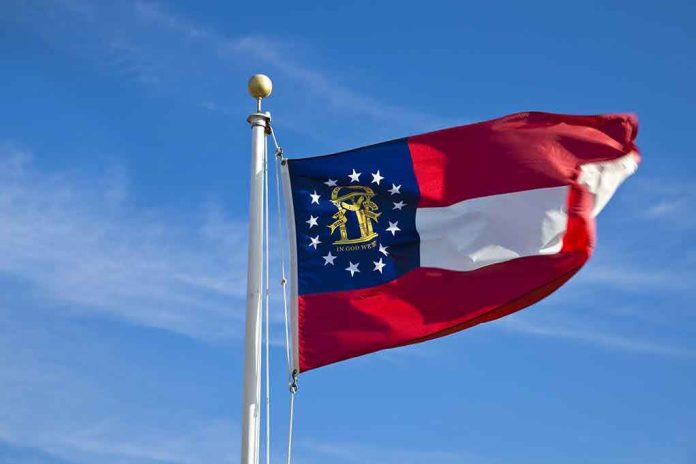
Trump’s early, “complete and total” endorsement of Lt. Gov. Burt Jones is reshaping Georgia’s 2026 governor’s race—and tightening the GOP’s focus on election integrity, lower taxes, and conservative governance.
Story Highlights
- President Trump endorsed Burt Jones well before the GOP primary, vaulting him to frontrunner status.
- The endorsement rewards Jones’s long-standing loyalty to Trump in 2016, 2020, and 2024.
- Rival Chris Carr is challenging Jones’s unlimited fundraising vehicle in court, a fight that could sway the primary.
- Democrats are assembling a field, signaling a competitive general election in a pivotal swing state.
Trump’s Early Endorsement Alters Georgia’s GOP Landscape
President Donald Trump posted a forceful endorsement of Georgia Lt. Gov. Burt Jones for governor on August 12, 2025, describing it as a “Complete and Total Endorsement” and emphasizing Jones’s loyalty going back to 2016. The unusually early nod instantly recast the 2026 Republican primary, placing Jones at the center of donor attention, grassroots energy, and media coverage. For conservatives frustrated by years of drift in state leadership, the endorsement signals a clear lane for a pro-growth, law-and-order agenda anchored in Georgia values.
Trump’s message highlights that Jones was the first Georgia legislator to back him in 2016 and remained firmly in his corner through 2020 and 2024. Jones quickly amplified the support on X and framed his campaign around election integrity, lower taxes, and defending conservative priorities. In a state that flipped blue in 2020 and returned to Trump in 2024, the endorsement also tests the durability of Trump’s influence in a modern Georgia coalition stretching from rural counties to Atlanta exurbs.
The Fundraising Fight That Could Decide the Primary
Attorney General Chris Carr, Jones’s leading GOP rival, moved to blunt Jones’s advantage by asking courts to block Jones’s use of a leadership committee that can raise unlimited sums during the primary. The dispute matters because fundraising capacity shapes field organization, advertising, and rapid response—especially when national attention lifts one contender. A ruling limiting Jones’s committee could rebalance the race; a green light would deepen Jones’s head start with donors, activists, and third-party conservative groups.
Georgia Republicans face a strategic fork: consolidate early behind Trump’s pick or prolong a resource-draining primary. Many grassroots conservatives, weary of establishment hedging on border security, crime, and cultural issues, will see consolidation as common sense. But Kemp-aligned donors and institutional figures may either rally to Carr or stay neutral, hoping the courts narrow Jones’s financial edge. The legal outcome will directly affect how quickly the party coalesces—and how competitive the GOP will be in November.
Why Georgia’s 2026 Stakes Are National
Democrats are assembling recognizable names, including figures with metro-Atlanta appeal, ensuring a hard-fought general election regardless of the GOP nominee. For constitutional conservatives, the governorship controls policy on taxes, regulation, school transparency, and election administration—areas where incremental shifts can either entrench woke bureaucracies or restore accountable government. An energized Republican turnout fueled by Trump’s endorsement could counter Democratic gains in suburbs, particularly if GOP messaging stays focused on safety, affordability, and parental rights.
Georgia’s recent history underscores the stakes. The state backed Trump in 2016, broke GOP ranks in 2020, and returned to Trump in 2024. That volatility makes endorsements, organizational muscle, and legal clarity on campaign finance unusually consequential. If Jones secures the nomination, observers expect a platform aligned with Trump-era state reforms: tightening election safeguards, prioritizing economic growth, and resisting federal overreach—positions likely to resonate with voters squeezed by inflation and frustrated by border chaos and bureaucratic creep.
What Comes Next: Endorsements, Courts, and Ground Game
Short term, watch the court’s decision on leadership committees, which could determine whether Jones’s money advantage endures. Also watch for signals from Georgia’s GOP establishment—whether they line up behind Carr, drift to Jones, or remain on the sidelines. National conservative donors, often responsive to Trump’s cues, may flood the zone for Jones if the legal path stays open. Democrats will calibrate against a Trump-aligned nominee by targeting metro turnout and painting GOP policies as too hardline.
🤝 𝗧𝗿𝘂𝗺𝗽 𝗘𝗻𝗱𝗼𝗿𝘀𝗲𝘀 𝗕𝘂𝗿𝘁 𝗝𝗼𝗻𝗲𝘀 𝗶𝗻 𝗚𝗲𝗼𝗿𝗴𝗶𝗮 𝗚𝘂𝗯𝗲𝗿𝗻𝗮𝘁𝗼𝗿𝗶𝗮𝗹 𝗥𝗮𝗰𝗲
Read more:https://t.co/BpZyHCnAPI pic.twitter.com/zEtiHGTJsv
— The Epoch Times (@EpochTimes) August 12, 2025
Long term, the race will measure the strength of Trump’s endorsement power post-2024 and shape Georgia’s policy trajectory on taxes, business climate, and election administration through 2030. For conservatives, the calculus is straightforward: secure a nominee who will deliver on election integrity, restrain spending, defend family values, and push back on federal meddling. Trump’s early bet on Burt Jones aims to do exactly that—setting the tone for a high-stakes contest in a state that can still swing on organization and message discipline.
Sources:
Trump makes endorsement in Georgia governor’s race
Trump endorses Burt Jones in Georgia governor’s race
What Donald Trump’s endorsement of Burt Jones means for governor’s race
Trump backs Burt Jones in Republican race for Georgia governor in 2026


